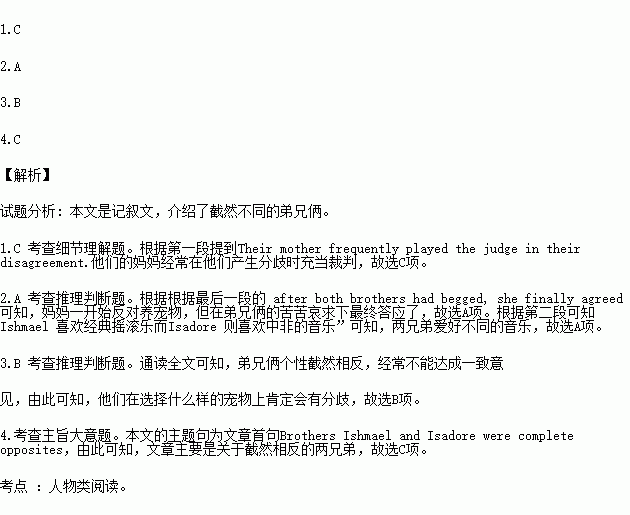题目内容
Brothers Ishmael and Isadore were complete opposites. People who knew them both could hardly believe they were from the same planet, let alone the same family. The boys were not unkind toward one another, but their personalities(个性)were so different that it was difficult for them to reach a decision they both liked. Their mother frequently played the judge in their disagreement.
Ishmael, the older brother,was athletic. He played baseball, football, and basketball.Isadore, the younger brother, hated sports. He was quieter and less active than his brother. He preferred spending his time on the computer, making short videos and writing short articles. Ishmael loved classic rock. He listened to bands like the Beatles. Isadore didn’t care much for those bands. He preferred music from Central Africa. Luckily for their parents, both boys enjoyed listening to music through headphones.
One other thing the brothers did agree on was that they wanted a pet. Mom had resisted getting one, but after both brothers had begged, she finally agreed.“We can get a pet, as long as you two take care of it,” she said.That means you do the feeding, you do the training, and if it needs to be walked, you do the walking. “No problem, Mom,”Ishmael and Isadore said together. “Good, we all agree,” Mom said. “Now, what kind of pet are we going to get?”
1.The two brothers’ mother often had to be the judge when they ______.
A. played basketball
B. had writing contests
C. couldn’t come to an agreement
D. couldn’t reach a decision on headphones
2.The underlined word“resisted”in the last paragraph probably means“_______”.
A. disagreed with B. insisted on
C. regretted D. suggested
3.What will probably happen next?
A. The brothers will both want a pet to play sports with.
B. The brothers can’t agree on what pet to get.
C. The brothers will both be unkind to the pet.
D. The brothers can’t agree on the pet’s name.
4.Which of the following is the best title for the passage?
A. brothers and their pet
B. brothers and their life
C. brothers of different personalities
D. brothers of different hobbies
 轻松夺冠全能掌控卷系列答案
轻松夺冠全能掌控卷系列答案


 do with people's character
do with people's character